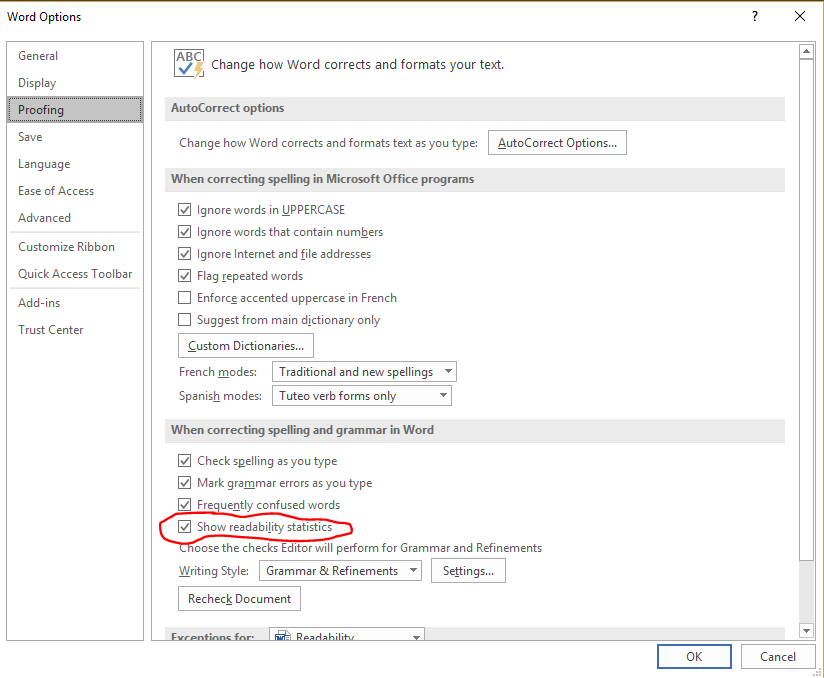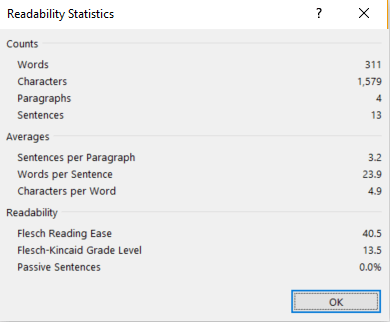Reporting and Improving Readability of your IRB Materials
When applying for Institutional Review Board (IRB) approval for your dissertation study, an important factor to consider is the readability of your study materials. In this case, study materials refer to any letters, documents, forms, or instructions that your participants will see (e.g., informed consent forms and invitation letters). These materials should be written such that your participants can read and understand the information. Readability is important in all studies, but it is especially important when studying children or other populations who have lower reading ability than the average adult participant. Depending on your study population and your IRB’s specific requirements, you may be required to produce a readability report for your study materials to prove that the reading level of the materials is appropriate for your participants. In this blog, we demonstrate how to produce a readability report and how to improve the readability of your materials.

Discover How We Assist to Edit Your Dissertation Chapters
Aligning theoretical framework, gathering articles, synthesizing gaps, articulating a clear methodology and data plan, and writing about the theoretical and practical implications of your research are part of our comprehensive dissertation editing services.
- Bring dissertation editing expertise to chapters 1-5 in timely manner.
- Track all changes, then work with you to bring about scholarly writing.
- Ongoing support to address committee feedback, reducing revisions.
You can use Microsoft Word to produce readability statistics for any text or word document. To do this, first go “Options” under the Word “File” tab. Next, go to the “Proofing” section of the Options and make sure that the “Show readability statistics” box is checked (as in the image below).

After you have done that, all you have to do is run a spelling and grammar check on your document. You can do this by clicking on “Check Document” in the “Review” tab.

Just note that Word will only complete the document check and produce the readability statistics if there is at least one spelling or grammar issue present in the document. So, if you have already run the spelling and grammar check previously and fixed all of the errors, you can just put an intentional typo in the document, run the document check to fix the typo, and then you will get your readability statistics. They will appear in a popup box like the one pictured below. You can then capture a screen shot of this report to share with the IRB if they require it.

The most important number from the report is the Flesh-Kincaid Grade Level, which corresponds to the United States grade level required to understand the text. For example, the Flesh-Kincaid Grade Level from the report above is 13.5, which means that the text is roughly at a college freshman or sophomore reading level. For research involving nonvulnerable adult participants, it is often recommended that your consent form and other materials be at an 8th grade reading level. Therefore, you would want your document to have a score of 8.0 or less on Flesh-Kincaid Grade Level. If your participants will be children or other individuals with reduced reading ability, your score will need to be even lower.
So, what if your readability grade level is too high and you need to lower it? There are two ways to improve readability score: 1) use shorter words and 2) write shorter sentences. The grade level score is calculated based on the average number of syllables per word and the average number of words per sentence. So, using words with fewer syllables and reducing the length of sentences will improve readability. An easy way to start is to look for long sentences and see if you can either shorten them or split them up into multiple sentences. Get rid of unnecessary words (e.g., “research study” can just be “study”) and split up compound sentences (e.g., “Your participation in the study is voluntary, and you can withdraw at any time.” to “Participation is voluntary. You can withdraw at any time.”). Once you have shortened your sentences, look for “big” words and see if you can replace them with smaller words. For instance, if we changed the previous example from “Participation is voluntary. You can withdraw at any time.” to “The study is voluntary. You can leave at any time.” the readability grade level of these two sentences improves from 9.7 to 4.0! We were able to greatly reduce the score by getting rid of some of the big words (i.e., “participation” and “withdraw”).
